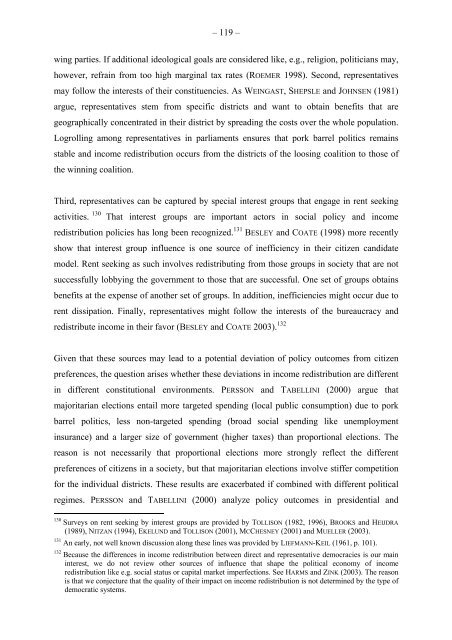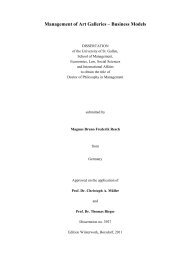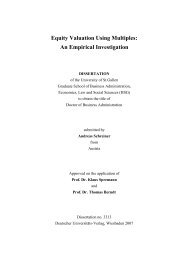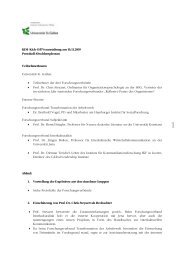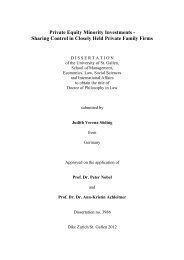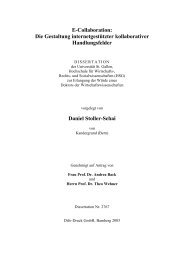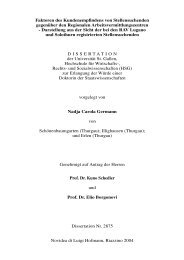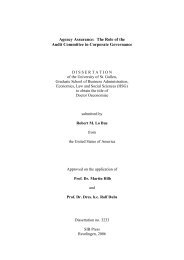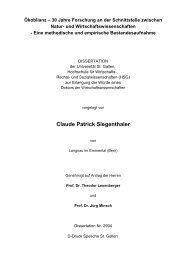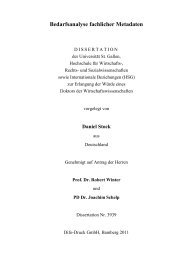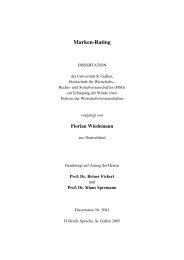The Impact of Direct Democracy on Society - Universität St.Gallen
The Impact of Direct Democracy on Society - Universität St.Gallen
The Impact of Direct Democracy on Society - Universität St.Gallen
- No tags were found...
You also want an ePaper? Increase the reach of your titles
YUMPU automatically turns print PDFs into web optimized ePapers that Google loves.
– 119 –wing parties. If additi<strong>on</strong>al ideological goals are c<strong>on</strong>sidered like, e.g., religi<strong>on</strong>, politicians may,however, refrain from too high marginal tax rates (ROEMER 1998). Sec<strong>on</strong>d, representativesmay follow the interests <str<strong>on</strong>g>of</str<strong>on</strong>g> their c<strong>on</strong>stituencies. As WEINGAST, SHEPSLE and JOHNSEN (1981)argue, representatives stem from specific districts and want to obtain benefits that aregeographically c<strong>on</strong>centrated in their district by spreading the costs over the whole populati<strong>on</strong>.Logrolling am<strong>on</strong>g representatives in parliaments ensures that pork barrel politics remainsstable and income redistributi<strong>on</strong> occurs from the districts <str<strong>on</strong>g>of</str<strong>on</strong>g> the loosing coaliti<strong>on</strong> to those <str<strong>on</strong>g>of</str<strong>on</strong>g>the winning coaliti<strong>on</strong>.Third, representatives can be captured by special interest groups that engage in rent seekingactivities. 130 That interest groups are important actors in social policy and incomeredistributi<strong>on</strong> policies has l<strong>on</strong>g been recognized. 131 BESLEY and COATE (1998) more recentlyshow that interest group influence is <strong>on</strong>e source <str<strong>on</strong>g>of</str<strong>on</strong>g> inefficiency in their citizen candidatemodel. Rent seeking as such involves redistributing from those groups in society that are notsuccessfully lobbying the government to those that are successful. One set <str<strong>on</strong>g>of</str<strong>on</strong>g> groups obtainsbenefits at the expense <str<strong>on</strong>g>of</str<strong>on</strong>g> another set <str<strong>on</strong>g>of</str<strong>on</strong>g> groups. In additi<strong>on</strong>, inefficiencies might occur due torent dissipati<strong>on</strong>. Finally, representatives might follow the interests <str<strong>on</strong>g>of</str<strong>on</strong>g> the bureaucracy andredistribute income in their favor (BESLEY and COATE 2003). 132Given that these sources may lead to a potential deviati<strong>on</strong> <str<strong>on</strong>g>of</str<strong>on</strong>g> policy outcomes from citizenpreferences, the questi<strong>on</strong> arises whether these deviati<strong>on</strong>s in income redistributi<strong>on</strong> are differentin different c<strong>on</strong>stituti<strong>on</strong>al envir<strong>on</strong>ments. PERSSON and TABELLINI (2000) argue thatmajoritarian electi<strong>on</strong>s entail more targeted spending (local public c<strong>on</strong>sumpti<strong>on</strong>) due to porkbarrel politics, less n<strong>on</strong>-targeted spending (broad social spending like unemploymentinsurance) and a larger size <str<strong>on</strong>g>of</str<strong>on</strong>g> government (higher taxes) than proporti<strong>on</strong>al electi<strong>on</strong>s. <str<strong>on</strong>g>The</str<strong>on</strong>g>reas<strong>on</strong> is not necessarily that proporti<strong>on</strong>al electi<strong>on</strong>s more str<strong>on</strong>gly reflect the differentpreferences <str<strong>on</strong>g>of</str<strong>on</strong>g> citizens in a society, but that majoritarian electi<strong>on</strong>s involve stiffer competiti<strong>on</strong>for the individual districts. <str<strong>on</strong>g>The</str<strong>on</strong>g>se results are exacerbated if combined with different politicalregimes. PERSSON and TABELLINI (2000) analyze policy outcomes in presidential and130 Surveys <strong>on</strong> rent seeking by interest groups are provided by TOLLISON (1982, 1996), BROOKS and HEIJDRA(1989), NITZAN (1994), EKELUND and TOLLISON (2001), MCCHESNEY (2001) and MUELLER (2003).131 An early, not well known discussi<strong>on</strong> al<strong>on</strong>g these lines was provided by LIEFMANN-KEIL (1961, p. 101).132 Because the differences in income redistributi<strong>on</strong> between direct and representative democracies is our maininterest, we do not review other sources <str<strong>on</strong>g>of</str<strong>on</strong>g> influence that shape the political ec<strong>on</strong>omy <str<strong>on</strong>g>of</str<strong>on</strong>g> incomeredistributi<strong>on</strong> like e.g. social status or capital market imperfecti<strong>on</strong>s. See HARMS and ZINK (2003). <str<strong>on</strong>g>The</str<strong>on</strong>g> reas<strong>on</strong>is that we c<strong>on</strong>jecture that the quality <str<strong>on</strong>g>of</str<strong>on</strong>g> their impact <strong>on</strong> income redistributi<strong>on</strong> is not determined by the type <str<strong>on</strong>g>of</str<strong>on</strong>g>democratic systems.


